Clock Foundation’s GrimAge Biological Age Test Review
Epigenetic age test provides information beyond biological age
Join the club for FREE to access the whole archive and other member benefits.
Here is another instalment in my quest to determine my biological age, using a variety of scientific approaches and commercial test providers.
This time, I’m looking at the TruAge Explorer saliva-based epigenetic biological age test.
DNA is an individual body’s operating manual – it is the code to produce the proteins that do all of the work in cells. Although mutations do accumulate over time (though probably not enough to drive ageing) it basically remains the same throughout your life. But the way cells work does change over a lifetime; so if the manual hasn’t changed, what has?
Epigenetics is what controls which parts of the DNA are exposed in each cell – so that heart cells can work differently to brain cells and skin cells, etc. When a specialised cell divides, its epigenetic pattern remains the same, but over time this control over which genes are expressed (and therefore which proteins are produced) loosens it grip, meaning the cells don’t operate optimally.
Researchers have discovered that the pattern of changes in the epigenome (for example, where the DNA is methylated) correlate to your biological age – that is, the equivalent age that your body is operating at, rather than the time passed since birth (chronological age).
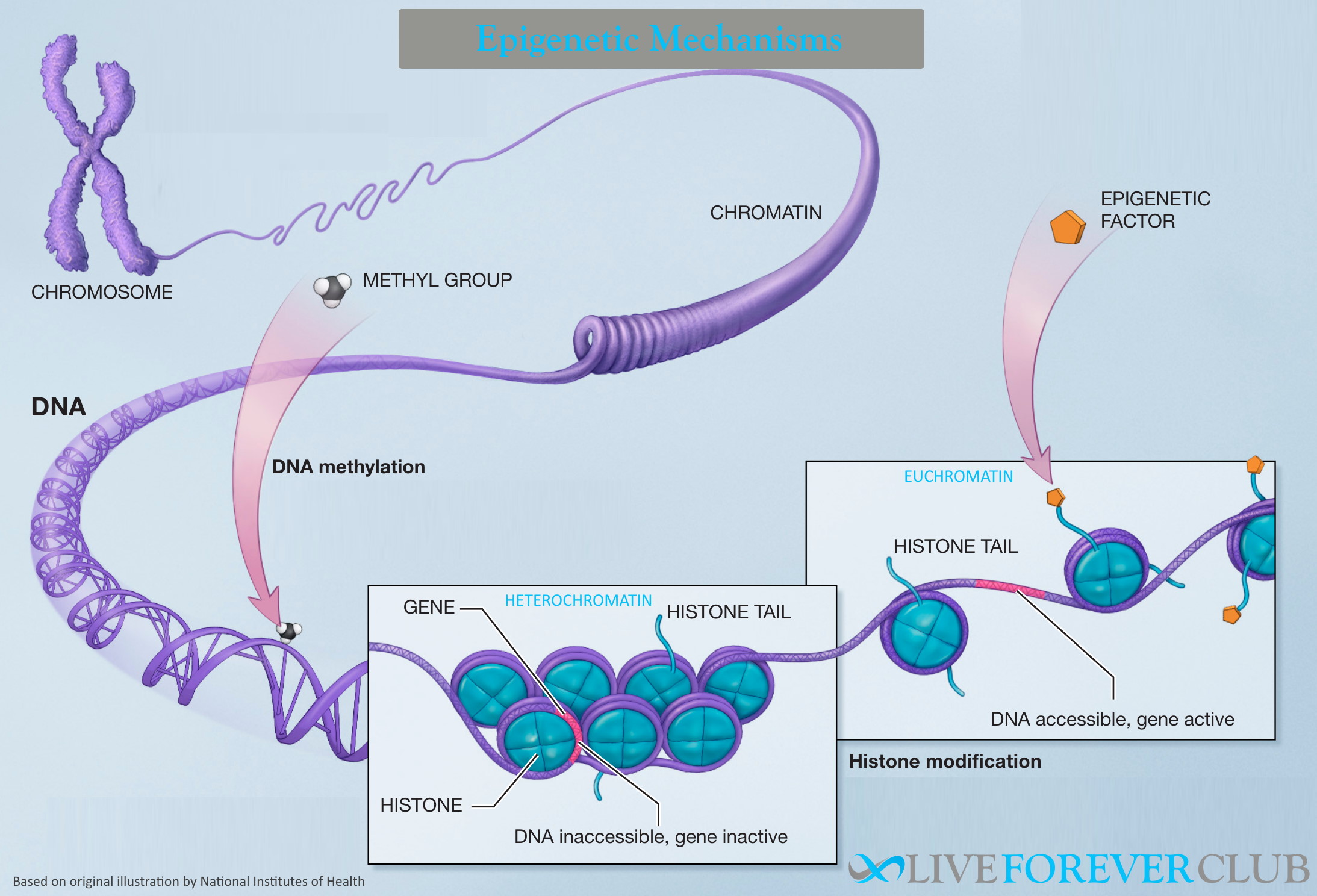
For a bit more information, see “What is epigenetics?” in the previous blog reviewing the myDNAge test.
The TruAge Explorer test is sold by TruMe Labs. They kindly provided the test kit for me to review for free, but (as always) this does not affect my review and they have no editorial input to what I’ve written.
The test costs $99 – the cheapest (by far) that I have come across. They also offer a two-pack version for only $85 each to allow you to monitor impacts of lifestyle changes over time.
The only extra cost is that you are responsible for paying the return postage – I used Royal Mail International Tracked & Signed for £6.85.
As with all epigenetic tests, TruAge measures the amount of methylation of your DNA at certain regions that have shown a link to ageing. Their lab uses the bisulfite conversion techniquw; one of the three common methods along with differential enzymatic cleavage of DNA and affinity capture.
TruAge analyses the DNA methylation (DNAm) profiles of 9 small regions (loci) of DNA. For comparison, the original Horvath clock uses 353 CpG sites and his latest GrimAge clock uses 1,030.
So maybe 9 sites seems a bit low, however, even GrimAge only uses a fraction of the
28 million CpG sites in the human genome. There will always be a statistical error, and TruMe labs claim that their studies show an error margin of 4.6 years.
NOTE: the TruAge Explorer saliva test shouldn’t be confused with the more expensive ($399) TruAge blood test from TruDiagnostic which uses 900,000 methylation loci to determine your biological age.
Having received the TruAge test kit, my first reaction was that this was going be make a pleasant change from having to prick my finger! Using a lancet doesn’t hurt, but just looking at the simple kit that didn’t need a lancet, alcohol swab, plaster, etc, was a small relief.
The sampling kit that arrived was simply the sample card, instruction leaflet and return envelope:
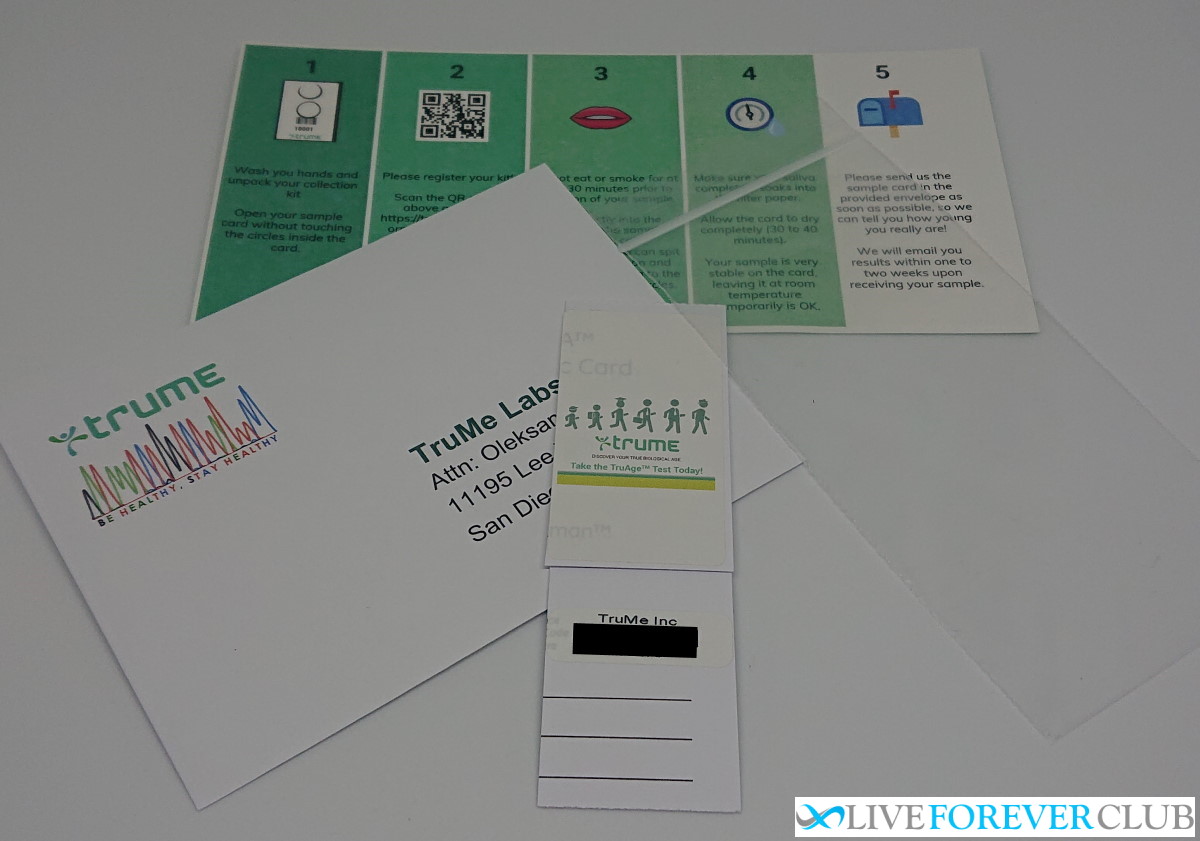
The instruction leaflet was nice and clear – reminding you of what you need to do before you start as well as the simple sample collection instructions.
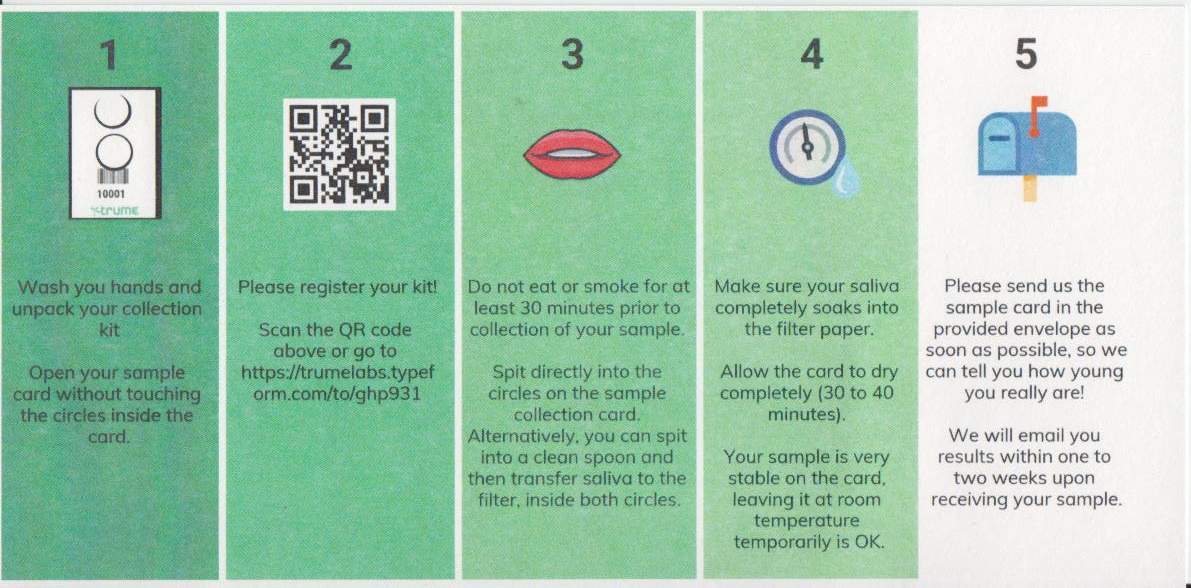
I registered my kit online, which was an easy process. As well as the kit number (redacted on my images) the form asked for my age, gender, ethnicity and overall health – I don’t think these are used to calculate my biological age, but they do go into the database to help improve the algorithm.
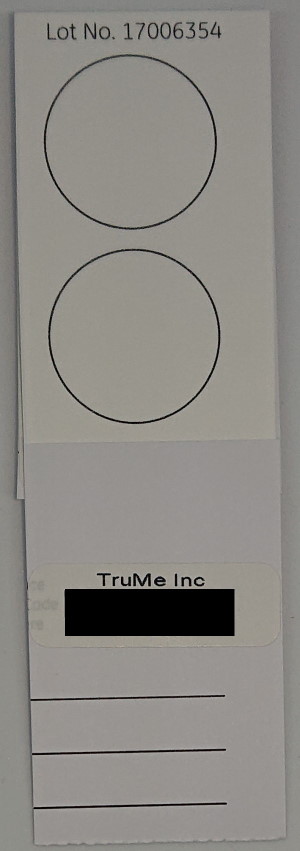
There’s no real preparation for the test, just don’t eat, drink, smoke, brush your teeth, etc. for half an hour before providing your sample.
Now to taking the actual sample. I worried how easy it would be to fill up the circles - but salivating is one of the body’s many processes that you just don't notice normally. As soon as I paused to think about having enough spit, there was plenty there - probably because I'd stopped the subconscious swallowing that people do about once every minute, so it quickly builds up.
First shot – look away if you’re squeamish!

What wasn’t so easy was the aim - maybe I was overthinking it, but I suddenly lost eye-to-mouth coordination. You can see I went right between the two circles with my second shot.
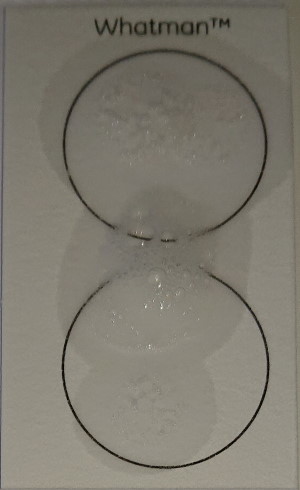
I could have used the spoon technique (spit into a spoon and then transfer it to the paper) but that seems to increase the risk of contamination if the spoon wasn’t washed & rinsed thoroughly.
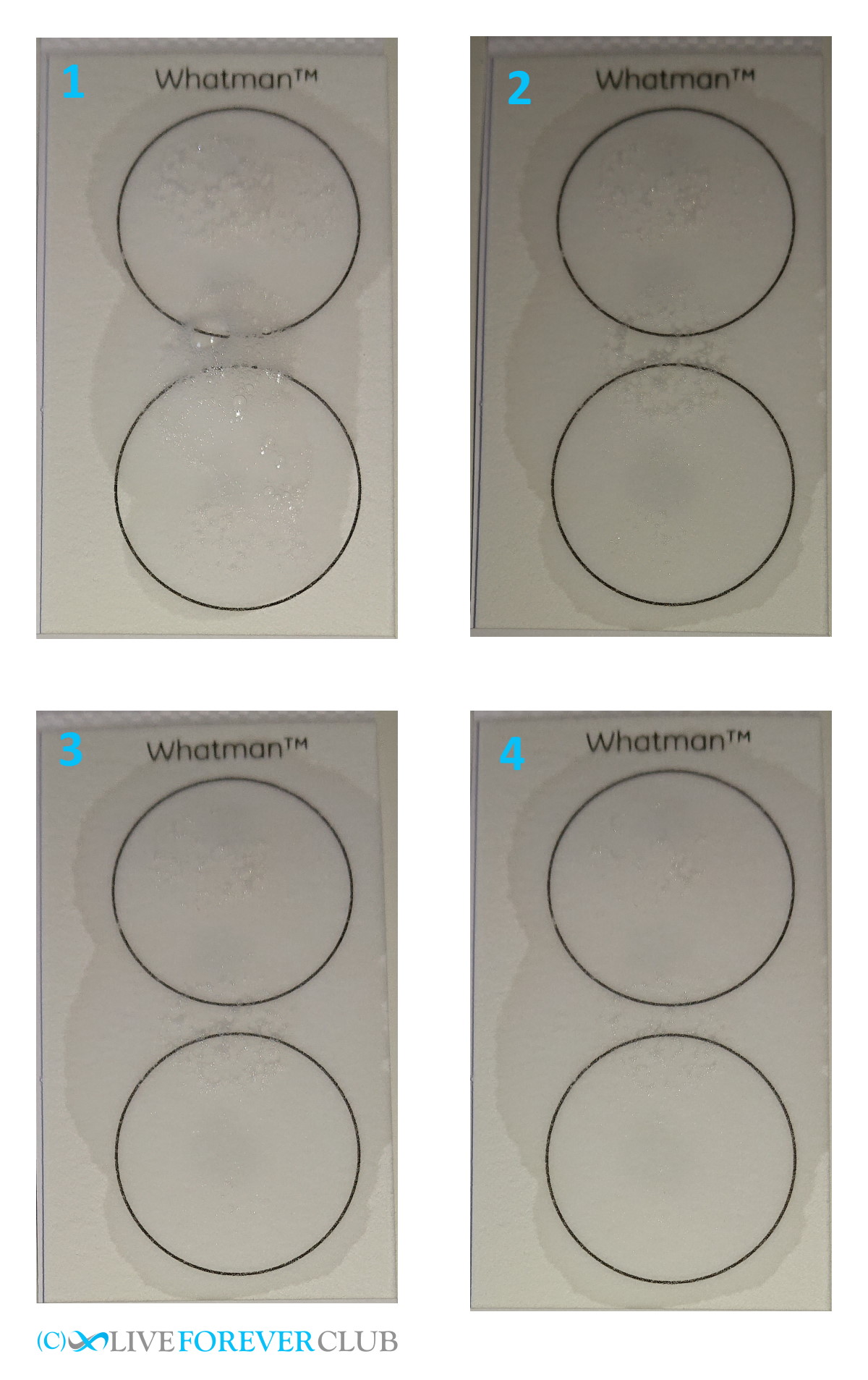
It may not be the prettiest sight, but just out of interest I took some photos of the saliva samples drying (about 5-10 minutes apart) just to see why they want it to rest so long. I can see the importance of it, as the saliva really gets absorbed into the paper over time.
And mine did take the full 40 minutes to dry, though perhaps I did over do the spitting/drooling. By allowing it to fully dry, the chemicals in the filter paper have time to lyse your cells (break them down) and fix the DNA (which is stored in the nucleus within the cell) to the filter paper and preserve it. TruMe Labs says that DNA on the filter paper is stable for up to a year at room temperature.
Once finished drying, it’s a simple case of putting the sample card into the plastic bag, and then the plastic bag in the envelope, and posting it back.
It took around 2 months to receive the result – though it was prime covid lockdown time, which TruAge said was slowing things down. Also, the first 2 weeks of that was the Royal Mail delivery – so you could pay for a faster international courier service if you wanted your result faster.
The epigenetic age result was sent via email, with a simple one page PDF report.
Key result: my biological age was 49.2 years, compared to 50.7 years at that time – so one and half years younger than I am.

That’s the first time I’ve had a biological age less than my chronological age, so quite relieved. Though given the range of biological ages I’ve been assessed at, I’ll be writing another blog sometime to compare the science and accuracy of each.
When I say key result, really that was the only result. Other test providers have shown where my result lies compared to other people (using a scatter graph or similar) or the percentage of people performing better/worse than me.
My biological age came out similar to my chronological age, but I don’t know how common that is. By definition, on average they will be the same, but I don’t know how much it can vary. For example, are 90% of people within a couple of years of their chronological age (i.e. time on this planet), with just a few outliers, or is there a broad spread? If the former, then I’m doing “OK”, but if the latter then I could feel like I’m doing better than most people. Though being under my chronological age means, by definition again I think, that I am doing better than average.
Possibly, by looking at only 9 DNA regions, this isn’t the most accurate of tests, and the report provides no other information beyond your biological age. However, you can’t beat it for cost. And for most biohackers it’s the relative change in biological age that is important – so rather than a one-off precision measurement, it may be better to be able to afford to take a test every few months to check the impact any lifestyle changes are making.
Normal aging is not caused by accumulation of molecular damage or telomere shortening – Aging-US
What is Epigenetics? – Centers for Disease Control and Prevention
Study finds that the DNA methylation GrimAge clock can predict an individual’s lifespan and healthspan with accuracy – Longevity Technology
CpG site – Wikipedia
DNA methylation in human epigenomes depends on local topology of CpG sites - Nucleic Acids Research, Volume 44, Issue 11, 20 June 2016
Measuring frequency of spontaneous swallowing - Australasian Physical & Engineering Sciences in Medicine 2007 Dec
Click on resource name for more details.
Carbiotix Gut Health Test Review
Jinfiniti NAD Test Review
Epigenetic age test provides information beyond biological age
Rate of shortening, shape and method of testing are all important factors
What can your glycome tell you about your true age?
Adrian tries out this home epigenetic test and is impressed with the level of detail in the reports